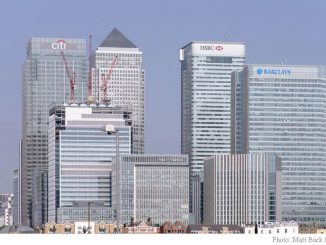
The victory of Donald Trump in the recent presidential election has sent shockwaves through various sectors, with Wall Street’s banking industry experiencing significant optimism. The decisive win has been interpreted as a signal for potentially lighter regulatory oversight, a prospect that has caused a notable rally in U.S. bank stocks.
Analysts, including Mike Mayo from Wells Fargo, have suggested that this development could mark the beginning of a new era for the banking sector, one characterized by less stringent regulations that have been in place since the 2008 financial crisis.
Major banks like JPMorgan Chase (JPM), Bank of America (BAC), Goldman Sachs (GS), Wells Fargo (WFC), Citigroup (C), and Morgan Stanley (MS) saw their stock values rise significantly in pre-market trading, reflecting the market’s expectation of a more favorable regulatory environment under a Trump administration. The enthusiasm stems from the anticipation that the new government might relax certain financial constraints, notably the controversial capital rules proposed by regulators, which would require banks to maintain higher reserves for potential losses, derived from the Basel III international capital standards.
These rules have been a point of contention, with banks actively campaigning against them, hinting at legal action if changes weren’t forthcoming. The aggressive stance was epitomized by comments from Jamie Dimon, CEO of JPMorgan Chase, who expressed frustration with current regulations at the American Bankers Association convention, indicating a readiness to push back against what he perceives as regulatory overreach.
The banking sector has already enjoyed a robust year in 2024, with an index tracking 24 of the largest U.S. commercial banks (^BKX) gaining 36%. This performance is attributed to a resilient U.S. economy, which has held up well under elevated interest rates, alongside a revival in investment banking and trading activities. The hope now is that with potentially reduced regulatory burdens, 2025 could offer even more opportunities for growth through increased lending and deal-making on Wall Street.
However, while the immediate reaction in the stock market has been positive, there are underlying concerns about the broader implications of Trump’s policies. During his campaign, Trump was relatively quiet about his specific plans for banking regulation, leaving investors to infer from his past administration’s approach. The potential for a significant increase in the federal deficit, projected to be $7.75 trillion over the next decade by the Committee for a Responsible Federal Budget, could have ripple effects on the economy, including the stability of financial markets.
Mike Mayo highlighted that while the short-term outlook for banks might improve due to regulatory relief, the combination of higher deficits and looser financial oversight might foster conditions conducive to economic volatility. This could potentially lead to boom-and-bust cycles that the financial crisis of 2008 taught everyone to avoid. Thus, while the immediate market response to Trump’s win is bullish for banks, the long-term economic strategy and its impact on the financial sector remain to be seen, with the balance between regulatory ease and economic stability yet to be struck.
- Bulenox: Get 45% to 91% OFF ... Use Discount Code: UNO
- Risk Our Money Not Yours | Get 50% to 90% OFF ... Use Discount Code: MMBVBKSM
Disclaimer: This page contains affiliate links. If you choose to make a purchase after clicking a link, we may receive a commission at no additional cost to you. Thank you for your support!




Leave a Reply